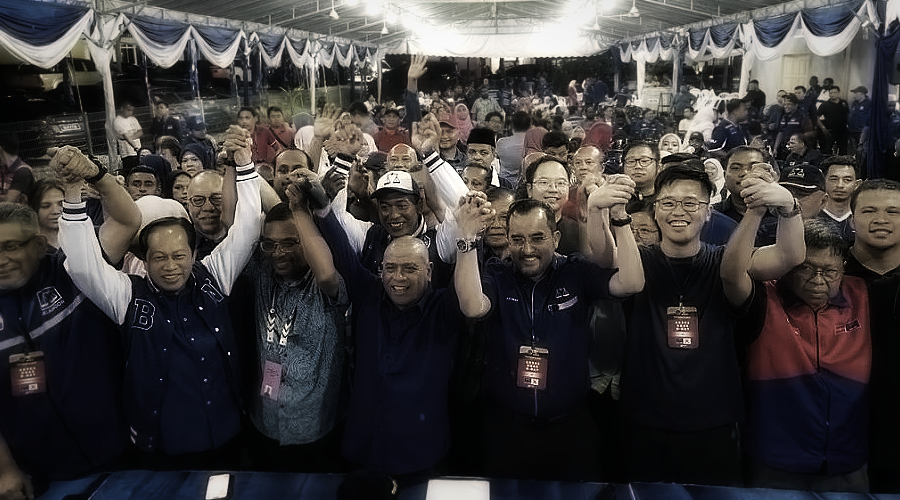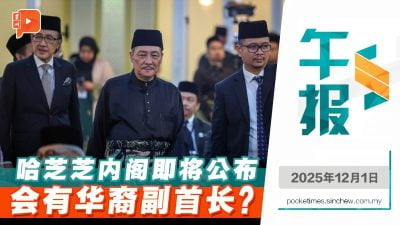
Barisan Nasional (BN) Umno candidate Mohamad Yusri Bakir won the Ayer Kuning by-election in a three-cornered fight, defeating candidates from Perikatan Nasional (PN) and Parti Sosialis Malaysia (PSM) by a majority of 5,006 votes.
Ayer Kuning has traditionally been a Umno stronghold. In the 2018 general election, despite a strong opposition wave that toppled the BN government, Umno still managed to win the Ayer Kuning state seat.
In the 2022 general election, although the “green wave” surged and challenged Umno’s territories, the BN candidate still secured victory in a fiercely contested race with a majority of more than 2,000 votes.
For this by-election, Umno already had an upper hand. With Pakatan Harapan (PH) lending its support, the victory was expected.
There was no doubt over Umno’s win; the focus was more on the size of the majority, the voting trends among different ethnic groups, as well as the rise or fall of the green wave. These three aspects are related.
Mohamad Yusri defended this stronghold with a 5,006-vote majority, far surpassing the 2,213-vote majority in 2022.
BN also swept 21 out of 22 polling stations, including Kampung Batu Masjid and Kampung Batu Tiga, where it had previously lost to PAS. In this sense, BN fought an impressive battle.
However, despite BN’s victory, there are still some noteworthy observations.
Firstly, PN and PAS managed to maintain their core support base and did not collapse.
In the 2022 general election, PN secured 6,812 votes in Ayer Kuning. In this by-election, despite a lower turnout rate of 58.07 percent (compared to 74.8 percent in the general election, a drop of 16.73 percent), PN still garnered 6,059 votes, proving that their local support has not significantly diminished.
PN continued to play the race card to win Malay votes. However, as previous elections have shown, in constituencies where non-Malay voters make up a significant portion, this tactic can only preserve their core base, not secure victory.
Throughout the by-election, PN continued to play the race card to win Malay votes.
However, as previous elections have shown, in constituencies where non-Malay voters make up a significant portion, this tactic can only preserve their core base, not secure victory.
PN may interpret the results optimistically, feeling reassured that their base remains solid, but relying on just the core base is not enough to win seats.
The Ayer Kuning by-election results serve as another reminder to PN that in the multiracial society of Malaysia, winning power cannot depend solely on the support of a single ethnic group.
Although PAS Deputy President Datuk Seri Tuan Ibrahim Tuan Man claimed that PN’s campaign machinery had some success in reaching non-Malay voters, the actual situation is clear to most.
Secondly, while BN and PH celebrate their landslide win, they should also seriously reflect on the issue of vote loss.
Judging from the surge in the majority votes, the BN and PH have achieved a one plus one equals two effect. However, in terms of total votes, it’s another story.
In the last general election, BN received 9,088 votes and PH 6,875 votes in Ayer Kuning, totaling around 16,000 votes. This time, BN only secured 11,065 votes. Even accounting for the lower turnout, the fact of vote loss remains evident.
PH seems to have lost some support among non-Malay voters. Among these voters, some chose not to vote or did not return home to vote; others shifted their support to PSM.
PSM candidate Bawani KS received 1,106 votes this time, almost double the 586 votes she garnered in the previous election.
It is generally believed that these additional votes mainly came from non-Malay voters who had previously supported PH but turned to PSM instead as they were unhappy with both PH and BN.
Although Bawani did not manage to retain her election deposit, her vote tally of over a thousand is already encouraging for PSM.
At present, the third force still lacks significant momentum, but if voters continue to feel disillusioned with both the Unity Government and PN, there is a possibility they may turn to alternative parties. The surge in votes for PSM in Ayer Kuning serves is an example.
The Ayer Kuning by-election concluded without causing major ripples in the political arena, but the subtle messages it revealed deserve attention and reflection by all political parties. This will help them offer better policies and services to voters and propose more attractive political narratives.
ADVERTISEMENT
ADVERTISEMENT








































